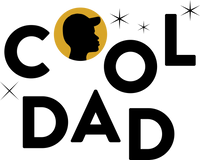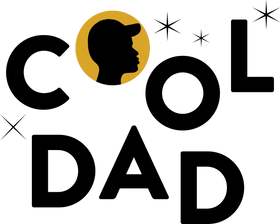#beacooldad with Devon Fanfair
By Elizabeth Lepro

#BeACoolDad Feat. Devon Fanfair
Like most six-year-olds, Sage Fanfair loves toys. Unlike most six-year-olds, she has startup entrepreneur Devon Fanfair for a dad.

Instead of buying his daughter a new toy every couple of months, Fanfair got Sage a 3D printer so that she could make her own. When Sage announced early in the pandemic that she wanted to start a business, he helped her make a website to sell the toys, along with blue-light blocking glasses for kids. Fanfair, who is first-generation Guyanese-American, is working to create a world full of opportunities for his daughter and others like her.
“I can't stop until my daughter Sage is pitching a brilliant idea, and there's someone on the check-writing side of the table that says ‘Man, she really reminds me of me, or she reminds me of my daughter, or she reminds me of my niece,’” Fanfair said. “Because that’s how it works. That’s how checks get written.”
Fanfair co-founded the startup studio Devland with his partner Miles Dotson to support the work of “wildly underestimated entrepreneurs,” including women and people of color. The program has since taken on 45 founders, created 14 companies, and raised about $9 million in funding. He also created the sanitizing wipes company Just Wipes.

We caught up with Devon — also CoolxDad’s newest board member! — to talk about his innovations, FemTech, and why his mom once cussed him out that one time.
Entrepreneurship requires so much creativity and innovation. Have you always been inventive?
I was always trying to build and create things for the benefit of people. I have always been the kid with ideas, trying to solve them and trying to create them. Even in college in 2006, I was working on wireless headphones because they didn't exist back then. I was working on what I called the Poo-EZ, which is now known as the Squatty Potty. Four years later, when they saw that on Shark Tank, my mom called me — and this is the only time she’s ever cussed me out — she's like, ‘Never again, do not take one of your visions all the way through!’
I love people. I have a gift for human connection. I think that's my superpower. I think all of those stories about being a first-generation immigrant, being part Indian, part Portuguese, part African; I ran track in high school and college and feel that my journey has allowed for me to believe there's not one type of human on Earth that I can't connect with through my experiences.
How did DevLand come to be?
I have a mechanical engineering degree. And I quickly learned after I graduated that I'm not really excited about helping someone approximate how to get more oil out of the ground. I would much rather solve problems with humans who can benefit.

For me, there’s two mindsets from which you create: There's a scarcity mindset where you say, there's not enough here so we need to get it before it's gone — that's energy and other commodities. Then there's an abundance mindset where you want to do something that can make something easier for someone, or make someone happier in the way that they're receiving it. I wanted to create from an abundance mindset. I made a decision. I knew I no longer wanted to be in corporate America as it is. So I, with my partner Miles, created Devland. DevLand is a startup studio that incubates any type of project from wildly underestimated founders.
What does that mean? ‘Wildly underestimated?’
It means women founders. It means Black, brown, BIPOC founders. It's literally any type of gender, age, race, nationality, that typically gets overlooked. They are actually the group with the most brilliant ideas because you develop these muscles of creation and innovation and ingenuity based on not having the resources that someone else has. For instance, if you give a child a basketball in a lower socioeconomic neighborhood, they’re going to be super grateful. They’re going to take a crate, cut a hole in the crate, take a nail and a hammer, put it up on a light pole. But if you give my daughter a basketball, she's gonna say ‘Hey, Dad, where's the basketball hoop?’ I’ll say, ‘There isn't one.’ And then she’ll throw the basketball away and go back to her iPad.

There is such an abundance of talented women entrepreneurs. In my opinion, FemTech — tech-enabled products that cater to female biological needs — is where Bitcoin was when it was only 15 bucks a coin. To invest in women right now is literally, with minimal due diligence, the best investment that we can make in the world.
Is there a startup that you’re working with now, or that you have worked with, that is a major success story?
There are a couple, actually. As it relates to women, we started a nonprofit organization called Founded and Funded By Women and the mission is about the fact that only 2 percent of accredited women in the US are investing. Period. We realized that it's important for women to invest in women.
We have a group of founders who have the technology and the IP that can essentially put out a wildfire anywhere 15 minutes or less from detection. We have an electronic battery division where we're 3D printing batteries. We have a company called Pietisserie, owned by a Black woman, which is now in over 16 Whole Foods and was actually featured in The New York Times.
What does it feel like to you to see the people you helped get started begin to thrive like that?
The first startup that I jumped into was called Plug, three or four years ago. It's a startup that essentially can detect someone digitally leaking your music. And I thought, being a green founder in the startup space, that we were going to build it, launch it, sell it, and then I was going to take my family and I to the south of France — as 90 percent of founders say — on a yacht. That's definitely a red flag if a founder says ‘You ever been to the South of France on a yacht?’ [Laughing]
So anyway, I raised about $3 million angel funding from people in Houston and then I got to the venture capital space, like the institution space. I researched 450 VCs in the U.S. and there were about 10 of them that were minority-owned and one of the minority-owned VCs was at $50 million, the second highest was $25 million and the rest were $10 to $2. I was deeply shocked. I thought that corporate America was racist or biased, but I had no idea how biased venture was. That's when it hit me.
My daughter was just born and I had just quit corporate America with a mortgage, two car notes. I was trying to find examples before I jumped, but then I realized that I am the example. So this story is not a beautiful beginning and middle, but it's looking great now. When I see a founder that doesn't look or speak or sound like a typical Silicon Valley archetype and I see them thrive, it just feels like this kind of multi-generational objective is being met. It’s so far outside of self. You just get this joy that it’s — that there’s validation. It’s validation.
Tell us about Sage.

Man, she's incredible. She's part 6 and she's part 39-year-old Black woman. She gives my wife a run for her money, that’s for sure. Our parents, well, at least by being immigrants, their whole mission was consistency and structure. And since I didn't have to think that way, when I was 15 or 16, instead I was like, ‘Oh, how can I change the world?’

So now Sage doesn't have to think about those things. Now she's thinking about the things that we're thinking about, like, ‘Am I well right now? What's my language to communicate that I have anxiety?’
Well, I'm excited to see what she someday creates!

Me too. My first goal is to make sure that whenever she pitches, there’s a person on the other side of the table that looks like her. My second goal is, I don't ever want to fully retire, but I would love to retire to being her board member.
What’s the top underrated — but totally necessary — Dad skill?
 Reacting in a neutral way. They’re hanging onto every word we say. Until the last few years, we never called toxic masculinity what it is. Every time you hear of a dad and daughter [and dating], you’re like ‘Oh he’s gonna get the shotgun!” I think as she grows, as she has other life experiences, it's really important to react in a manner that's very neutral. Because sometimes your initial reaction has a lot more to do with learned habits from your past and not actually the culture that you're creating going forward.
Reacting in a neutral way. They’re hanging onto every word we say. Until the last few years, we never called toxic masculinity what it is. Every time you hear of a dad and daughter [and dating], you’re like ‘Oh he’s gonna get the shotgun!” I think as she grows, as she has other life experiences, it's really important to react in a manner that's very neutral. Because sometimes your initial reaction has a lot more to do with learned habits from your past and not actually the culture that you're creating going forward.
So you’re talking about taking a moment to think about how you’re going to respond to a situation rather than instinctively responding to it?
Right. I really make it a point in my household to show that my wife and I are equal in many ways — but to be completely honest, women are much stronger than we are. Even in the household, I want to cultivate this idea of equity and equality. Like, I don’t want my own chair! That doesn't make any sense to me. I don’t want to be the head of the table. That kind of showmanship doesn’t have any value for me. I don’t need a male junior. Sage is my junior. She’s the next king.
What have you gotten out of CoolxDad and what brings you to it?

If you ask Sage, she’ll interject and say, ‘Well, he’s cool and he’s a dad.’
When someone is not their authentic selves, because they believe their authentic self is not good enough, that makes me sad. With CoolxDad, it’s so genuine in its mission; it’s so authentic in its purpose. I was initially attracted to the authentic energy of the organization — of Kevin — and also having a need to be part of changing the definition of what it means to be a dad. To have a group of men who truly want to grow and expand, not for themselves, but for their families and their kids. If you look at the last calendar of events, it’s extremely well-rounded. It’s not just sports, it’s mental wellness, it’s financial wellness, it’s about having these events where your children can participate.
I see CoolxDad being this global community, kind of like the Soho House is. You can go into major cities and you can find a sense of community no matter where you are.
Written by Elizabeth Lepro
Photography by William Issac

